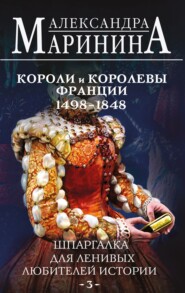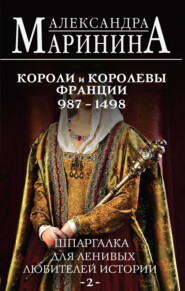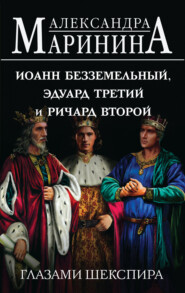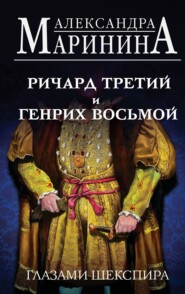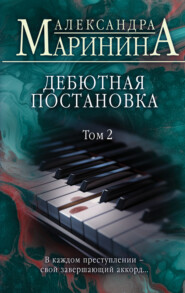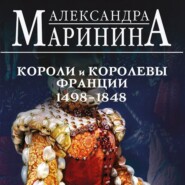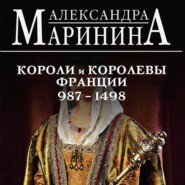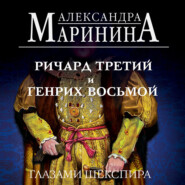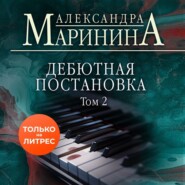По всем вопросам обращайтесь на: info@litportal.ru
(©) 2003-2025.
✖
The Stylist
Настройки чтения
Размер шрифта
Высота строк
Поля
“Strange that you need additional terms for contact with him,” her mother noted dryly. “It seems to me you used to have excellent contact.”
“Mama!”
“All right, all right, don’t be mad. I’ll do what I can. Does Alexei know?”
“Of course.”
“God, what a child I brought into this world!” Her mother sighed. “You never had any tact. Why are you tormenting him?”
“I’m working, Mother. I’m not enjoying myself with a former lover,” Nastya said wearily.
She loved her mother. But in recent years, Nadezhda had stopped understanding her completely. Especially after the several years abroad. Nastya felt much more comfortable with her stepfather, who had been on the force all his life and understood her problems right off the bat.
* * *
Her mother called her at work late the next evening, just as Nastya was getting ready to leave.
“Do you know, it’s a horrible story,” Nadezhda announced in agitation. “It turns out, Volodya’s wife went to a resort and vanished. They searched for almost a month and then found her body in the woods. Some creep wanted her camera. To be killed over some stupid camera! I can’t accept that.”
“Where did it happen?”
“I don’t know, somewhere in Central Russia. On the Volga, that’s for sure.”
“What happened to his legs?”
“That’s not clear. No one knows what’s ailing him. He hasn’t told anyone. One man said that Volodya had been beaten viciously.”
“Who’s the man?”
“You don’t know him.”
“That means I’ll get to know him,” Nastya insisted. “Who is he?”
“Malyshev. Artur Malyshev. He’s a docent at the Institute of Foreign Languages. Arc you going to get in touch with him?” “Absolutely.”
“Why?”
“Because. It has to be done, Mother. If he was beaten, I want to know why the police have no record of it. And if he wasn’t, I need to know why your Malyshev thinks he was.” “What difference does it make why he thinks so if it’s not true?”
“A big difference,” Nastya explained patiently. “Even the wildest rumor starts somewhere. Someone made it up for some reason and told it to someone else. Even if there is no truth in it, somebody’s idea was behind it. And if there is some truth, then it is always necessary to find out just what truth it is.” “Well I hope that there won’t be any problems for Malyshev if it turns out that the mugging was just a lie,” her mother asked in concern.
“Relax, nothing will happen to him, to your precious Malyshev. Unless of course, he made it up himself. Are you going to give me his phone number or do I have to find it?’
Nadezhda sighed and dictated the address and telephone number. After she hung up, Nastya began getting ready to leave and was putting on her jacket when Yura Korotkov rushed into her office.
“Nastya, I think we’ve got a lead!” he burst out. “Oh, man, I’m exhausted, I’ve been running around all day. Make some coffee, be a pal.”
He plopped down on a chair and stretched out his legs blissfully. Nastya hung her jacket back in the closet and turned on the teapot. That meant her trip home was put off by at least an hour.
“Let me tell you,” Korotkov began triumphantly. “A week ago someone wiped out a video kiosk. Lots of fingerprints, but no match. The thief is new to us. The kiosk owner went through the inventory and said that what was stolen came from various sections. The tapes were selected. He made a list of the stolen tapes, but the principle of selection is not clear. Not all mysteries, or thrillers, or adventure, or science fiction, or erotica. A little bit of everything. Fourteen in all. And there was a clever cop on the team who said that naturally there wasn’t enough time to watch all fourteen films to find out what they had in common, but it was possible to look through the opening credits. They found a smart computer that can print stills from video, they looked and found that there was one actor in all the films. Not a star, of course, a bit player, unknown, and he’s on screen only five or seven minutes in each film. But his looks!” “You’re kidding,” Nastya said softly. “Docs he really look like them?”
“Peas in a pod,” Korotkov said, sipping the steaming coffee. “I compared it to the photographs of the dead boys. He and Oleg Butenko have the same face.”
Oleg Butenko was the first of the missing boys. September 1995. Found dead in December. That meant it was a homosexual maniac. Nothing worse than a serial killer. Catching serial killers is hard, relentless work. There’s usually nothing to connect the maniac with the victims, often they did not know each other and there was no personal motive. How do you catch them? How do you prove it, if he doesn’t confess?
Of course, there were a few things in this case. First of all, the prints that the perpetrator left at the scene of the videotape theft. Second, he had to have a place where he kept the wretched boys until they died. And third, the thin, wavering track leading to the Daydream Estates.
Jostling in the empty metro car, Nastya mentally drew a chart of next steps. First: clear up the question of the kiosk’s security. Why was it so vulnerable that night? Did none of the kiosks there have an alarm system or just that one? Who could have known that the kiosk would be unprotected that night?
Second: why was that particular kiosk robbed? Not another in another part of town on another street? Because no one was guarding it or because the thief lived nearby?
Third: how did the thief know that the kiosk had the tapes he wanted? Did he come by and check it out? Or did he break in here knowing that the selection was pretty much the same all over town?
Fourth: did this kiosk rent tapes? If so, perhaps the thief had rented from them, more than once, and that’s why he knew their inventory. And if he frequented the place, he might have overheard information on the night-time security. All the video rental places had to be checked, they had to get their log books and copy down the names of people who rented those films. It was an ocean of work, but it had to be done. It was a real clue.
Fifth: why did he steal the tapes instead of simply buying them without any hassles? Too expensive? And keeping boys on drugs for weeks and weeks wasn’t expensive? Or he could have rented them, which was much cheaper, and made copies. Of course, he needed a second VCR for that. Didn’t he know anyone who could lend him one?
The man who robbed the kiosk didn’t fit Nastya’s idea of the man who abducted the boys and kept them for long periods in his home prison and stuffed them full of drugs. Of course, she shouldn’t be trying to tie them together. The logic of madmen did not resemble the logic of normal people. Perhaps it was essential for him to steal the tapes. Maybe he got high on it.
When Nastya got out at the Shchelkovskaya station, it was dark. The workload and the many cigarettes of the day had given her a headache and she wanted a little walk. She started past the bus stop, but remembered that it was late and that Lyoshka would certainly be worried. Better take the bus. She had not borrowed her husband’s car, so Alexei could be sure that she had not gone to see Solovyov. She wouldn’t have gone all that way without a car. But he would be worried anyway. Especially since last year she was almost killed right in front of the house when she was coming home late from work. That time she was saved by a miracle, a man who then died a few days afterward. There wouldn’t be a second miracle, no point in counting on that.
The bus ride was four stops. Nastya got out and into the wake of a couple headed in her direction. The road from the stop to the house was unpleasant in every way – unlit, deserted, full of potholes, so that a late evening walk brought no joy. The self-engrossed couple “walked” Nastya to her entrance and moved on, probably in search of happiness or at least some privacy.
It was dark in the entryway, too, but not as scary since it was home base. As she got out of the elevator on her floor, she suddenly flashed on Solovyov’s house. The spacious hallway, the wide porch.
Her keys were hiding in the depths of her enormous bag, and Nastya couldn’t get her hands on them. She gave up the fruitless search and rang the bell. To her surprise, it was quiet on the other side of the door. Maybe Lyoshka was watching TV and did not hear the bell? She rang again. No reaction. She had to find her keys.
Alexei was not home. Nastya remembered that their car had not been parked downstairs. That was strange and somehow unpleasant. She undressed quickly, wrapped up in a warm robe, and sat down in the kitchen in front of a large bowl of cut-up tomatoes and cucumbers with parsley and dill.
She liked her apartment, where she was always happy, cozy, and peaceful. Of course, it was tiny, a studio, where two people couldn’t fit in the hallway, with a small bathroom, but Nastya didn’t feel crowded. Even together with Lyoshka she felt comfortable. It was only after seeing Daydream Estates that her own apartment started seeming wrong. And not because Nastya had never seen good housing before. Not at all. Just take her half-brother’s apartment – a palace, it took an hour to walk through it. She visited Alexander once or twice a month, but that never made her think the apartment on Shchelkovskaya was alien, dark, and ridiculous. Maybe because her brother was not like her in any way. He had a different education, a different worldview, a different profession. Alexander Kamensky was a businessman, a banker, a wealthy energetic man with a good head for commerce. So the fact that he lived in a different way seemed perfectly natural to her.
But Volodya Solovyov was of the same breed as Nastya. A man with a talent for foreign languages who made his living that way. An ordinary liberal arts person. Not an MBA. A translator. Nastya could work just like that in a publishing house, translating books, if she had not chosen the police, rotting corpses, weeping victims, and the dubious pleasures of exposing criminals. The fact that she could be living like Solovyov made her eye more critical as she looked around her apartment.
“Why do I live in a hovel?” she thought, chewing her salad without tasting it. “Why? I’m not poor, by general standards. Doctors and teachers make much less, not to mention pensioners. Where does the money go? I have just enough to last from paycheck to paycheck. I guess I just don’t handle it right. And here’s another problem: I don’t have any free time. That means that I have to buy expensive food. When I was in college, I used to buy kidneys at the butcher store, which were very cheap but took a half day to prepare. First you had to soak them for four hours, then boil them, and then roast them. I don’t have time for that now. I’m lucky to get home by ten and I leave at eight in the morning.”
She didn’t have time to shop during the day and she had to shop in the convenience stalls near the metro, which were very expensive. In the olden days you could buy sausage that was mostly filler, disgusting stuff, but if you worked on it for a half hour you ended up with something edible. First you had to cook it in water with spices, then slice it and place on a thick piece of bread, add ketchup, sprinkle on chopped herbs and garlic, cover with a slice of cheese and then pop into the oven or a covered skillet over low heat. After those manipulations the starchy sausage could be used for food with some pleasure, but it all took time. Who had time when you got home at ten fainting with hunger? That’s why you buy prosciutto, which costs three times as much, but is delicious and does not require cooking. You slice and eat.
Anyway, even if Nastya started economizing on food, she would never save enough for a house like Solovyov’s. It was a different level of income. She could not understand why a person knowing three languages could live in such a comfortable and beautiful house while another person knowing five languages and also of use to society by doing hard, dirty but very necessary work, why this second person was forced to live in a cramped tiny apartment. She did not doubt for a minute that her former lover was an honest man. He wasn’t a crook or a cheat. And his money was clean, honestly earned. There was an injustice, an incorrectness, in our life today, that’s all. And the result of that incorrectness was the difference between Nastya and Solovyov, which, really, should not have existed at all.
She caught herself thinking about Solovyov with pleasure. And of the fact that she would go sec him again tomorrow.
“You are wrong, Anastasia,” she said wearily to herself. “You should be working, but you keep thinking about pleasure. Toss that out of your head, you’re not of an age when mistakes are easily forgiven. Especially, the second time around.”
Nastya finished the salad, washed her bowl, stood under a hot shower for a quarter hour to relax and warm up, and crawled into bed. She was going to call her husband’s parents in Zhukovsky – maybe he had gone to see them. She was reaching for the phone when she stopped herself. Don’t. He might think she was checking up. And what if he weren’t there and his parents didn’t know where he was? Whatever else she may want, “catching” Lyoshka was not one of her goals. Not because she was a hundred percent sure of his fidelity. Alexei was a normal male who could fall for a beautiful, interesting, sexy woman, so unlike Nastya, who was unattractive, cool, and absolutely without sex appeal. From the point of view of probability, it was quite possible, but Nastya never felt that she had to know about it. What for? Of her almost thirty-six years, she had known Chistyakov twenty. More than half her life. They would grow old together, they would always be together, and no matter what happened, they would be best friends. This assertion had been tested by time and was unimpeachable. And then, was she herself without guilt? Certainly not.
In other words, she did not call Lyoshka’s parents. But just as she was putting out the light, the phone rang.
“Nastya?” asked an uncertain voice.






